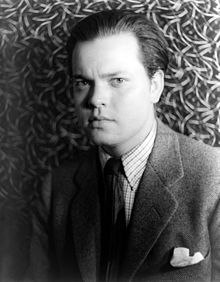
On this date in 1915, in Kenosha, Wis., the director and title role star of the classic 1941 film Citizen Kane was born. A loosely drawn, but scathing portrait of newspaper magnate William Randolph Hearst, it stands among the most influential films ever made.
Welles’ next film was The Magnificent Ambersons, a nostalgic look at the America of half a century earlier, but in its own way a frontal attack on class, snobbery and privilege. Later films include The Lady from Shanghai, Journey into Fear, The Third Man, his screen adaptation of Othello, Touch of Evil, and others. His larger-than-life personality and often outsized, over-budget demands as a director often placed him at the edge of respectability in the Hollywood studio system, until eventually his welcome wore out. His authority as auteur was many times overridden by the studio bosses, usually to the detriment of his concept.
Welles was a precocious child drawn to theater and every form of art. Still a teenager, he starred in productions at Dublin’s famous Gate Theatre. He debuted on Broadway in 1934 as Tybalt in Romeo and Juliet. His life changed when he met the producer John Houseman. They formed a theater company and when FDR’s Works Progress Administration started, they established a production unit within the Federal Theater Project that gave work to unemployed professionals in the theater industry. One of their headline-grabbing ventures was an all-Black version of Macbeth.
Welles and Houseman achieved notoriety when they agreed to stage composer Marc Blitzstein’s left-wing labor musical The Cradle Will Rock, which extolled CIO-type unionism. Fearing congressional disapproval, the government closed down the show on its opening night in June 1937, which led to one of the most famous episodes in Broadway history. The whole cast (and audience) marched to a vacant theater in uptown Manhattan where, without sets, costumes, and orchestra, and unable to appear on any other stage while employed by the Federal Theater, they sang their parts from their seats in the house, the composer himself playing a battered old piano. The play later went on to a regular Broadway run, now under the auspices of the Mercury Theatre. In 1937, Welles was only 22 years old, often dubbed the “boy wonder” or the “boy genius.”
After a series of stunning productions under the Mercury aegis, such as a Julius Caesar in contemporary fascist dress, with expressionistic lighting learned from ultra-modern German and Soviet directors, and incidental music by Blitzstein, Welles launched his Mercury Theatre on the Air, exploiting the new medium of radio to bring sophisticated culture to audiences at home. One of his most celebrated coups (by now he was all of 23) was his radio production of H.G. Wells’ “The War of the Worlds,” a breathless fictional account of a Martian invasion that caused panic and widespread evacuations owing to the hyper-realism of the actors’ delivery. “I much prefer people who rock the boat to people who jump out,” he is remembered for saying.
And then Hollywood called. Film became from then on the focal point of Welles’ career, starting with Citizen Kane (he was 26).
In his later years Welles faced ridicule and contempt as his career declined. He was chided for shilling for a middle-grade wine label on TV, and for his rotund appearance. Nevertheless, at his height he represented the best that American culture could produce: advanced, humanistic, even radical ideas packaged in attractive, original, accessible ways for the masses.
Welles died in Los Angeles at the age of 70 on October 10, 1985.
Photo: Wikimedia (CC)

MOST POPULAR TODAY

High Court essentially bans demonstrations, freedom of assembly in Deep South

Zionist organizations leading campaign to stop ceasefire resolutions in D.C. area

U.S. imperialism’s ‘ironclad’ support for Israel increases fascist danger at home

UN warns that Israel is still blocking humanitarian aid to Gaza







Comments